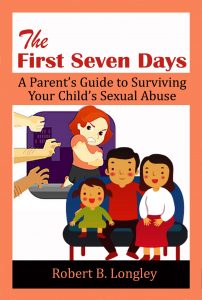Welcome to ringside for the sexual abuse story of the year. The Penn State sexual abuse case is likely to grab headlines for weeks to come. Strangely the offender isn’t front an center in the story. Instead it’s about who knew about it, and what they did or didn’t do about it. This same drama gets played out on smaller stages every day.
Let’s start with Mike McQueary. He is the assistant coach that reported the abuse in the first place. You would think he would be the hero in this drama. Instead he is staying off the playing field because of death threats. This is probably the saddest aspects of sexual abuse cases. People will do just about anything to protect the image of someone that they hold in a position of trust. Destroy, discredit or scare the source of the information and then it doesn’t have to be true. In our case, one of the families who came forward had their mailbox and pole ripped out of the ground and thrown threw the window of the car. They got the message and moved. This isn’t how things are supposed to work. The new homeland security slogan is “If you see something, say something”. You would think the same would be true for sexual abuse cases.
Confronting a Legend
Next on the stage is Joe Paterno. Here is a legend in college football and a household name – so it’s news worthy. Based on my understanding of mandatory reporter responsibilities, and what I have read so far I believe he fulfilled the requirements. Now this is where it gets murky. I keep seeing phrases like “he should have done more”, which may or may not be true. But hey, he’s Joe Paterno, of course he could have done more – right? One of the problems with mandatory reporting laws is that there is no standard. Even within states, there is generally confusion about who is responsible for what.
In Connecticut the Department of Children and Families is generally responsible for setting policy for reporting and receiving reports. Then there is the Department of Public Health which generally handles licensing which identifies certain groups of mandatory reporters. And then there is the Department of Education which sets policies for educators. Seems logical enough, but when someone doesn’t file a report try to figure out who is responsible for addressing the issue. As we have seen in this case, at least two people thought they were following the reporting process and we still have a breakdown of this magnitude.
Coverup
Next we move to the cover up or perceived coverup. Maybe it was intentional, maybe it wasn’t. In the reporting process, there is no guarantee that a report that is started, makes it all the way to it’s logical destination. This is because mandatory reporting is treated as a management function. Follow the chain of command. You tell your boss, and they tell their boss, and they are supposed to alert the authorities. Sounds good in theory, but let’s go back to a childhood game – telephone. One of the biggest problems with sexual abuse is that people are not comfortable talking about it. Begin with a graphic report of a man raping a child, and two or three versions later you have a perceived interaction with an underage person that appeared to be of an inappropriate nature. And then you have someone in a management position deciding it was probably an isolated incident or a mistake.
So how do we fix this reporting nightmare going forward. My choice would be changing the mandatory reporting process. In addition to providing actual education to mandatory reported, make it a direct reporting process. Reports should be made directly to the police or the state agency responsible for abuse reporting. There are too many chances for the process to break down with the current approach. There is also the dilution of the information that occurs when a report is filtered through several management layers before becoming an actual report. And just like see something, say something campaign – it only works if you tell the right person.
Let us know if we can help you dealing with your family’s sexual abuse victim situation. For ideas to get started please check out our book on what to do during the early days after disclosure.

